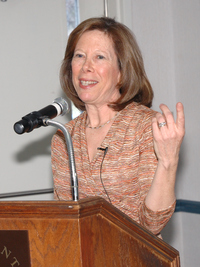Unconventional Oil: Illuminating the Global Paradigm Shift to New Petroleum Fuels
“We will never, ever run out of oil,” says Deborah Gordon in this interesting podcast on the future of fossil fuels.

Deborah Gordon is a nonresident senior associate at the Carnegie Endowment for International Peace (Energy & Climate Program), where her policy research focuses on oil, climate, and transportation issues in the United States, China, and globally. Ms. Gordon spoke at the Wednesday, March 13, 2013 meeting of the Senior Statesmen of Virginia. The program was moderated by SSV board member Grace Zisk.
Since 1996 she has been a policy consultant specializing in transportation, energy, and environmental policy for non-profit, foundation, academic, public, and private-sector clients. From 1996 to 2000 she founded and co-directed the Transportation and Environment Program at the Yale School of Forestry and Environmental Studies and from 1989 to 1996 she founded and then directed the Transportation Policy Program at the Union of Concerned Scientists.
Additionally, Gordon has worked at the U.S. Department of Energy’s Lawrence Berkeley Laboratory (1988-1989), under a grant from the U.S. Environmental Protection Agency. Gordon began her career as a chemical engineer with Chevron (1982-1987). Ms. Gordon also authors a blog on the topic of unconventional oil.
Program Summary
What happened about three years ago shocked the world and the oil companies: recognition of the fact that we will never, ever run out of oil. It’s not oil though, because now economically the prices are high enough, and technologically we’re adept enough, that we can transform anything with hydrogen and carbon in it into liquid fuel.
When you live in the world of scarcity, you act in one way, and when you live in the world of plenty, you act in a very differently, and we’re in a world of plenty, so this is confronting the complexities of oil. Seventy percent is in transportation and 30 percent in everything we use and enjoy in our lives, from plastic bottles to diapers to pace makers.
With so much oil now available, the question is how are we going to prioritize which oils we will use. Even with all the growth in gas, oil will remain the dominant energy force world-wide in the foreseeable future.
After detailing all of the types and sources of new oil, Ms. Gordon described the important knowledge gaps on new oil including: make up of oil and their supply chains; price of oil; geography of oils; geopolitics of oils; sound oil investments; and the social impacts on water and climate change.
